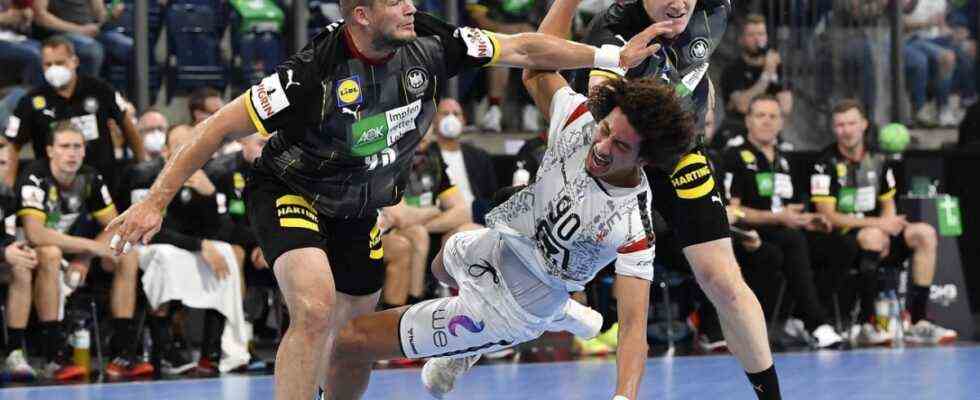The view from the balcony extends far out over the water. The Tokyo waterfront shines on the horizon, with the harbor bay and excursion boats in front of it; if you stretch your legs here after strenuous games, you’ve done well. On Thursday the German handball players were able to move into their quarters in the Olympic village, they found it comfortable right away. It was “bigger than in Rio,” said sports director Axel Kromer. Feeling good is an essential thing when you are setting up a new home, and vision always helps anyway: when traveling, in sports, in life.
They have already spent a week at the training camp in Japan, around 700 kilometers away in Tokushima; Schoolchildren waved flags to the reception, and the ground staff danced on departure. Japan makes it easy for Alfred Gislason’s team to feel welcome. “We noticed: We are welcome here,” said game designer Philipp Weber. This is a better way to settle in. Of course, they would like to stay until the end of the games. Then when the medals are distributed.
Whereby, you mustn’t confuse dreams and goals. Bob Hanning had set nothing less than the Olympic victory in 2013 as a long-term goal, it was also a declaration of war at the beginning of his tenure as Vice President of the German Handball Federation (DHB). At a time when many of the current Olympians weren’t even in the squad and the national coach was still called Martin Heuberger. In any case, Hanning has already announced the upswing – but now, eight years later, do you have to be measured against it?
If you listen to national coach Alfred Gislason, you can already tell that the interpretative sovereignty is no longer with the departing Hanning, in autumn the 53-year-old resigns from his offices. “We give our goal to ourselves. Nobody can say we have to get a medal,” said Gislason rather casually at a media round in Japan, and that shows an important quality of the renowned coach: he doesn’t have to be loud to be heard .
In theory, as Hendrik Pekeler put it, the Olympic tournament is the easiest thing to win: After the group phase, it goes straight to the quarter-finals. But in practice these opponents are waiting in the German group: European champions Spain, record world champions France, Norway, Argentina and Brazil. “We know that we have to beat a few big teams in the group,” says Gislason, the first four make it into the knockout round. “I would warn against saying that there are only four teams in the group,” he also says; Brazil was not a bad team and Argentina was a surprise team at the last World Cup. In general, the World Cup: The Germans took twelfth place in Egypt in January, a historically poor result.
The quality in the inner block is great – but “not necessarily in terms of width”
The tournament ended seven months ago due to the defeat against Spain, and it is precisely against them that the start of the Olympic tournament on Saturday is due. Actually, you should get nervous convulsions in the German team at this word: Spain. There was hardly any other topic in the past few days than the game in which they still led with three goals after 43 minutes and finally lost with 28:32.
“The defeat in Egypt really annoyed me because we gave away the victory ourselves,” said Gislason. The fact that, unlike at the World Cup, he can now fall back on top performers Hendrik Pekeler, Finn Lemke and Steffen Weinhold, at least improves the chances of success in Tokyo. Gislason is aiming for the semifinals “first”, especially the goalkeeping and defense performance should pave the way there. The fact that defensive specialist Patrick Wiencek is not injured hurts the troops. The quality in the inner block is great, but “not necessarily in terms of width,” says Gislason, “that is a big problem in the event of injuries”.
At the age of 39, goalkeeper Johannes Bitter is the oldest German handball player who has ever played at the Olympics, while the backcourt talent Juri Knorr is the youngest at 21. A lot will depend on playmaker Weber, who also has to find the right moves against offensive defenses – not necessarily a strength of the Germans. “He has all the qualities a world-class player needs,” says Gislason of Weber, “for us it is extremely important that he continues on his way.” And you can tell that the 28-year-old feels like taking on responsibility. “We’ll have to deal with the situation as it is when two or three attacks don’t work that way,” he says; Bridging these moments as harmlessly as possible is “my job in the team”.
A win against Spain at the beginning would be a welcome therapy, the German team lacks at least as little preparation as it lacks body tension. “The joy that it starts is huge,” said backcourt player Kai Häfner after moving into the Olympic village on Thursday, and coach Gislason, at 61 years of age, can also gain a lot from the experience despite Corona circumstances. 1984 in Los Angeles and 1988 in Seoul he was there as a player, now he is making his Olympic premiere as a coach. And if the group stage is survived, he might also meet his compatriot who knows how to do with the medals: Japan coach Dagur Sigurdsson. That finally led the Germans through the entire tournament in 2016 – to bronze.

